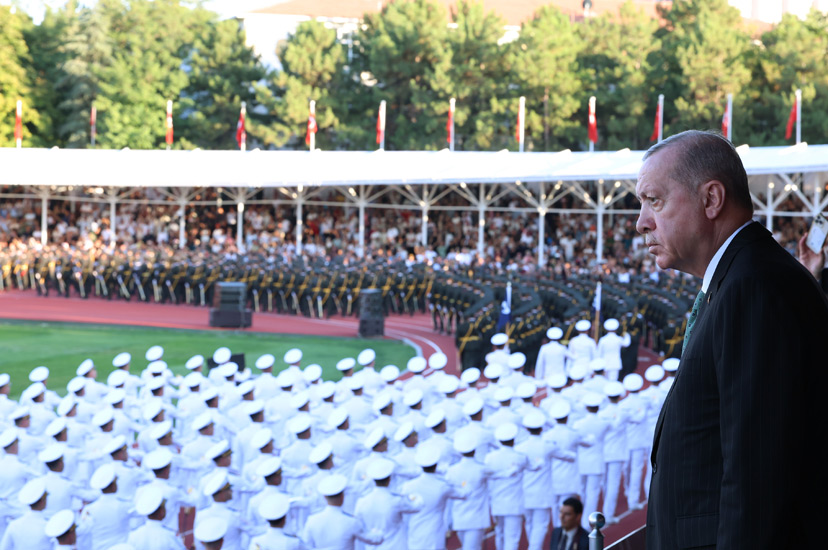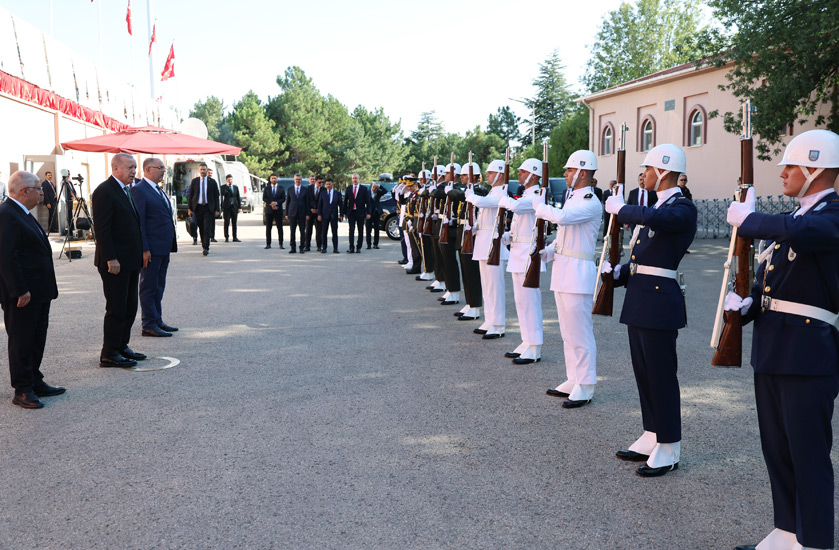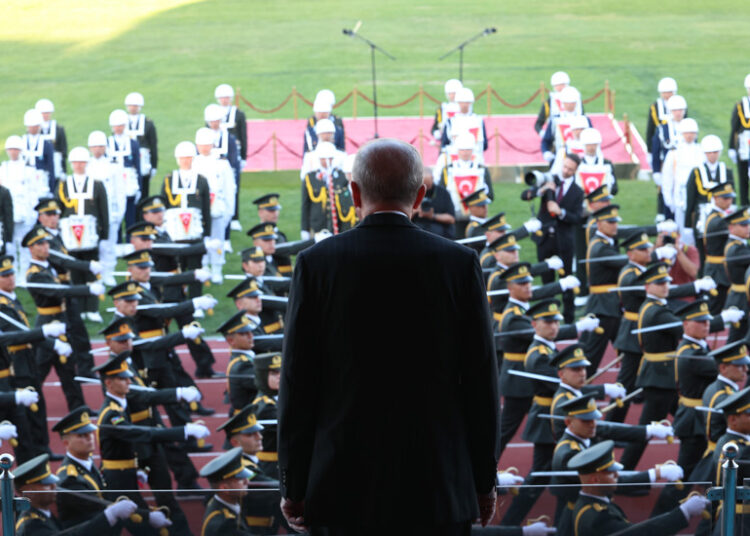Levent Kenez/Stockholm
More than three-quarters of Turkish military officers are now graduates of the National Defense University, a school created by the Islamist government in the aftermath of a 2016 coup attempt to replace the country’s historic military academies and reshape the armed forces under a new centralized system. The figures reflect how deeply the officer corps has been rebuilt through graduates of an institution directly controlled by Turkish President Recep Tayyip Erdogan.
According to official data shared by Erdogan during a graduation ceremony on August 30, 76 percent of officers in the Land Forces, 45 percent in the Naval Forces and 31 percent in the Air Forces are graduates of the National Defense University. Among noncommissioned officers, the numbers stand at 59 percent in the Land Forces, 32 percent in the Naval Forces and 24 percent in the Air Forces. Erdogan emphasized that these proportions would continue to rise with almost the entire officer corps soon composed of graduates of the university.
Many opposition figures have since claimed that the coup attempt in 2016 was in fact a false flag operation organized by the National Intelligence Organization (MİT), and then-chief of general staff Gen. Hulusi Akar to remove officers in the military considered disloyal to Erdogan.
Since its establishment in 2016, the institution has produced 19,735 graduates across its academies. The Land Forces Academy accounts for the largest share with 15,755 officers, including 754 foreign students. The Naval Forces Academy has graduated 2,167 cadets with 100 of them from abroad. The Air Forces Academy has produced 1,793 officers including 148 foreign cadets. Erdogan praised the graduates and highlighted that the numbers demonstrate how the institution has become central to the Turkish Armed Forces.

The National Defense University was created abruptly after the closure of the War Academies, which had trained officers since 1848. The War Academies were long considered the backbone of Turkey’s professional military education system, particularly for staff officers who could rise to senior command positions. The government argued that these schools had been compromised and used as platforms for infiltration by groups accused of orchestrating the failed coup. By putting all military education directly under the Ministry of Defense, officials said they were facilitating tighter oversight and ensuring loyalty within the ranks.
The restructuring extended beyond the schools themselves. The procedure for becoming a staff officer was overhauled. Previously, only first lieutenants and captains could take the staff officer exam. Under the new rules the opportunity now extends to officers up to the rank of lieutenant colonel. Candidates begin with distance learning programs administered by the National Defense University before moving on to two separate in-residence training sessions at the newly established Joint War Institute. Only those who pass both stages are admitted into the staff officer corps.
At the same time the scale of dismissals from the Turkish Armed Forces fundamentally altered the institution. Erdogan disclosed in 2023 that 1,524 of 1,886 staff officers were purged after the coup attempt. Out of a total of 32,189 officers serving on July 15, 2016, 10,468 were expelled. According to recent Ministry of Defense figures, 24,339 personnel in total, including officers, noncommissioned officers and civilian employees, were dismissed.
These purges reshaped the upper echelons of command. Only 42 of the 325 generals and admirals who were serving in 2016 retained their positions or were promoted in the years after the coup. More than 150 generals were prosecuted and convicted. Despite official statements that only 8,651 troops took part in the coup attempt, representing about 1.5 percent of the armed forces, thousands were removed from duty. Of the soldiers who allegedly participated, 1,761 were conscripts and 1,214 were cadets. Analysts note that the breadth of dismissals went far beyond those who were directly implicated.
The new system has raised concerns among critics who argue that political loyalty outweighs merit in determining who gains entry into the National Defense University. Candidate selection includes interviews and assessments overseen by commissions in which pro-government networks reportedly play a role. Among them is SADAT, a private defense consultancy founded by a former Erdogan aide, which opposition parties have accused of influencing admissions.
Some in Turkey still believe that young officers loyal to the country’s secular founder, Mustafa Kemal Ataturk, remain a dominant force within the armed forces. But an incident last year showed that the government of Erdogan has little tolerance for Kemalist voices in the ranks.

On August 30, 2024, during the Turkish Military Academy’s graduation ceremony attended by Erdogan, a group of newly commissioned officers recited the traditional oath that was removed from the program after 2016. Five of them went further, chanting, “We are the soldiers of Mustafa Kemal,” a slogan long tied to Turkey’s secular tradition. The gesture was widely seen as a symbolic act of defiance against Erdogan’s Islamist-leaning policies.
Within days, the five officers were dismissed from the military. The move was approved by Selcuk Bayraktaroglu, who had been unexpectedly appointed chief of general staff earlier that month. Although a disciplinary board had initially proposed only a reprimand, Bayraktaroglu authorized their expulsion from the service in 2025.
The implications of the restructuring extend into the future of military leadership. Under the Turkish Armed Forces Personnel Law, only staff officers are eligible for promotion to general or admiral, eventually qualifying for positions such as chief of general staff. With so many staff officers purged and the new system still maturing, the pipeline of candidates who meet the legal requirements has narrowed considerably. Unless the law is amended, the military could face difficulties in filling its top command posts in the coming years.
Erdogan has presented the transformation as a safeguard for Turkey’s national security and a step toward democratizing the armed forces. “We did not stop at reforms in education and personnel,” he said at the most recent ceremony. “We have rebuilt the armed forces from the ground up.” His government insists the military is now more national and more representative of the public’s will.
For analysts, the numbers themselves tell the story. With nearly 20,000 graduates since 2016 and with majorities in some branches already trained under the new system, the officer corps is rapidly being reshaped. In a few years nearly every officer in the Turkish Armed Forces will have studied at the National Defense University, marking the definitive end of the era when the War Academies supplied the country’s military leadership.
The military purge of 2016 and the creation of the National Defense University have ensured that Turkey’s armed forces, once known for their independence and their role as guardians of secularism, are now closely tied to Erdogan’s political authority. As the president frequently notes, the statistics themselves illustrate the scale of the transformation.












